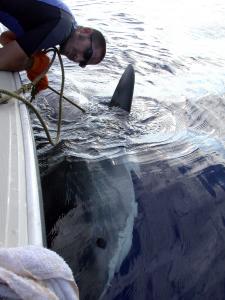New Study Shows Birthing Migration of Tiger Sharks

Each animal was tagged with a transmitter that emitted high frequency sound in a unique code. Photo courtesy University of Hawaiʻi.
By Wendy Osher
A new study shows that female tiger sharks depart from the remote Northwestern Hawaiian Islands toward the main Hawaiian islands in the late summer and fall, during pupping season, researchers said.
The study, conducted by researchers from the University of Hawaiʻi at Mānoa and the University of Florida, is reportedly scheduled for publication in the November 2013 issue of Ecological Society of America’s journal, Ecology.
Researchers say the study and others like it, “have solidly overturned mid-20th century ideas that tiger sharks stick to chosen territories in specific coves and bays.”
The study reportedly involved the tracking of more than 100 tiger sharks over a 7-year period with transmitter tagging, UH officials said.
According to information released by UH, researchers say a quarter of the mature female tiger sharks in the remote coral atolls of the northwestern chain migrate toward the main islands, swimming as far as 1,500 miles.
“When we think of animal migrations, we tend to think of all individuals in a populations getting up and leaving at the same time, but it’s not as simple as that. Some are resident and some are transient,” said Yannis Papastamatiou of the University of Florida in a press release issued today.
He urged people not to leap to the conclusion that the movement is directly related to recent shark bite incidents in Hawaiian waters including a recent fatality of a German tourist on Maui.
In the press release, Papastamatiou said the data shows that, “tiger sharks don’t hang around the same bit of coastline for more than a few weeks,” and said he believes that a cull or selective slaughter as was done in the ’60s and ’70s doesn’t work.
Maui Mayor Alan Arakawa said he believes most shark bites are accidental in nature, and does not personally like the idea of hunting sharks or setting up barrier fences off shore.
Co-author, Carl Meyer of the University of Hawaiʻi at Mānoa’s Hawaiʻi Institute of Marine Biology also issued a statement saying, “Both the timing of this migration and tiger shark pupping season coincide with Hawaiian oral traditions suggesting that late summer and fall, when the wiliwili tree blooms, are a period of increased risk of shark bites.”
The reference is to the traditional saying, “Pua ka wiliwili nanahu ka manō; pua ka wahine u‘i nanahu ke kānāwai,” which is translated in ‘Ōlelo No’eau Hawaiian Proverbs & Poetical Sayings by Mary Kawena Pukui, 1983, to mean, “When the wiliwili tree blooms, the sharks bite; when a pretty woman blossoms, the law bites.”
The tiger shark birthing season is known to occur in September to early November, officials said. Additional information provided by the state Department of Land and Natural Resources notes that there appears to be an increased risk of being bitten by a shark during certain months, in particular October through December.
A two-year, $186,000 shark study, commissioned by the state Department of Land and Natural Resources and headed by study co-author, Meyer, is scheduled to begin this month on Maui.
So far this year, there have been eight confirmed incidents in Hawaiian waters, including four within the last month, state officials said.
Of the eight shark bite incidents, DLNR officials say four were on Maui, three on the Big Island, and one was on Oʻahu.
***Supporting information courtesy University of Hawaiʻi at Mānoa; Talia Ogliore – PIO, vice-chancellor for research.










